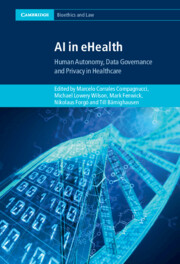Book contents
- AI in eHealth
- Cambridge Bioethics and Law
- AI in eHealth
- Copyright page
- Contents
- Contributors
- Preface
- Acronyms
- 1 Mapping the Digital Healthcare Revolution
- Part I Platforms, Apps and Digital Health
- Part II Trust and Design
- Part III Knowledge, Risk and Control
- Part IV Balancing Regulation, Innovation and Ethics
- 11 Doctors Without Borders? The Law Applicable to Cross-Border eHealth Services and AI-Based Medicine
- 12 Organisational Readiness for the Adoption of Artificial Intelligence in Hospitals
- 13 Regulating the ‘Benefits’ of eHealth
- 14 Data Protection Implications of Forensic Genealogy
- 15 Health Research, eHealth, and Learning Healthcare Systems
- Index
- Cambridge Bioethics and Law
- References
11 - Doctors Without Borders? The Law Applicable to Cross-Border eHealth Services and AI-Based Medicine
from Part IV - Balancing Regulation, Innovation and Ethics
Published online by Cambridge University Press: 08 September 2022
- AI in eHealth
- Cambridge Bioethics and Law
- AI in eHealth
- Copyright page
- Contents
- Contributors
- Preface
- Acronyms
- 1 Mapping the Digital Healthcare Revolution
- Part I Platforms, Apps and Digital Health
- Part II Trust and Design
- Part III Knowledge, Risk and Control
- Part IV Balancing Regulation, Innovation and Ethics
- 11 Doctors Without Borders? The Law Applicable to Cross-Border eHealth Services and AI-Based Medicine
- 12 Organisational Readiness for the Adoption of Artificial Intelligence in Hospitals
- 13 Regulating the ‘Benefits’ of eHealth
- 14 Data Protection Implications of Forensic Genealogy
- 15 Health Research, eHealth, and Learning Healthcare Systems
- Index
- Cambridge Bioethics and Law
- References
Summary
By their very nature eHealth applications – including telemedicine, AI-based medicine and ‘smart’ medical devices – are ubiquitous: These tools may be used by the physician next door as well as in the most remote locations abroad. Moreover, highly sensitive medical data may flow around the world within a split second. Against this backdrop, eHealth and telemedicine services can be provided from – and the necessary data can be transferred to – virtually every corner of the world. By contrast, the scope of application of regulation relating to AI-driven medicine, as well as eHealth and telemedicine, is usually confined to the legislating state. Moreover, the number and complexity of rules and regulations in this field vary considerably from state to state. Does this mean that international MedTech businesses may simply set up camp in the jurisdiction most favourable to their business models? For practitioners in telemedicine, the MedTech industry providing AI applications or digital medical devices such as eHealth apps, as well as for patients, it is essential to know which laws govern activities undertaken in cross-border scenarios. This concerns licensing requirements and the level of data protection as well as contract and tort law applicable to eHealth, telemedicine and telesurgery services.
Keywords
- Type
- Chapter
- Information
- AI in eHealthHuman Autonomy, Data Governance and Privacy in Healthcare, pp. 311 - 333Publisher: Cambridge University PressPrint publication year: 2022

